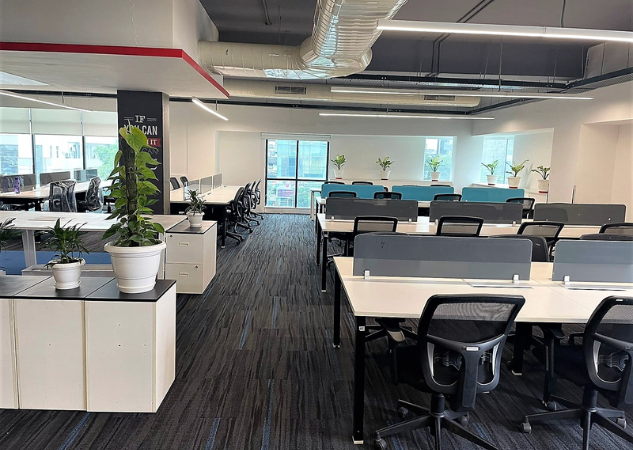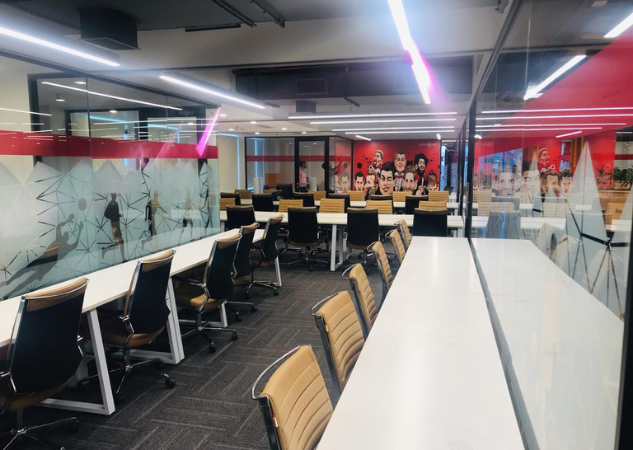Meeting rooms and conference rooms may sound similar, but they serve different purposes in a workplace. Understanding these differences helps businesses choose the right space for their needs.
💡 Are you looking for Coworking space in Gurgaon, Noida or Delhi? We are just a call away. Call Now: 08999 828282
10 Difference Between a Meeting Room and a Conference Room
- What is a Meeting Room?
- What is a Conference Room?
- Size and Capacity Differences
- Purpose and Use Cases
- Technology and Equipment
- Atmosphere and Design
- Booking and Availability
- Cost Considerations
- Accessibility for Entrepreneurs
- Choosing the Right Space
1. What is a Meeting Room?
A meeting room is a small to medium-sized space designed for discussions, brainstorming sessions, and quick team huddles. It usually accommodates 4–12 people and is ideal for internal meetings, one-on-one sessions, or small project updates. Meeting rooms are often equipped with whiteboards, basic presentation tools, and comfortable seating. They are best for informal or semi-formal gatherings where collaboration is the focus. When learning what is a meeting room, think of it as a flexible space that promotes communication and quick decision-making without the need for complex technology or large-scale arrangements.

2. What is a Conference Room?
A conference room is typically larger and more formal than a meeting room. It is designed to host bigger groups, often 12–50 people, for structured discussions, client presentations, and strategic planning. What is a conference room? It’s a well-equipped space featuring projectors, video conferencing tools, microphones, and large tables for presentations. Businesses use conference rooms for high-stakes meetings, training sessions, or board discussions. The design often focuses on professionalism and advanced technology to ensure smooth communication between in-person and remote participants.
3. Size and Capacity Differences
When comparing meeting room vs conference room, size is one of the main differences. Meeting rooms are compact and ideal for small gatherings, often under 12 participants. Conference rooms, on the other hand, are spacious, designed to accommodate large groups comfortably. The seating arrangement in a conference room is often formal—such as U-shape or boardroom style—while meeting rooms may have more casual setups. Choosing the right size ensures participants are comfortable and engaged without wasting resources on unused space.
Also Read: How To Choose The Ideal Space for Holding a Meeting?
4. Purpose and Use Cases
The difference between meeting room and conference room becomes clear when you consider their purposes. Meeting rooms are perfect for quick catch-ups, creative brainstorming, or progress reviews. Conference rooms are more suited for formal negotiations, client meetings, or annual strategy sessions. A startup may rely heavily on meeting rooms for day-to-day collaboration, while an established corporation may require both types of spaces for different needs.
5. Technology and Equipment
Technology plays a major role in distinguishing meeting room vs conference room setups. Meeting rooms usually offer basic tools like whiteboards, monitors, or simple video conferencing options. Conference rooms, however, are equipped with advanced systems—multiple screens, surround sound, high-definition video conferencing, and presentation clickers. This makes conference rooms better suited for complex presentations and hybrid meetings involving participants from different locations.
6. Atmosphere and Design
When exploring the difference between meeting room and conference room, atmosphere matters. Meeting rooms often have a casual, collaborative vibe, encouraging open discussion. They may feature flexible furniture, colorful walls, and natural lighting. Conference rooms, on the other hand, are designed for formality, often with neutral tones, long tables, and a professional setting. The design reflects the type of discussions typically held there.
7. Booking and Availability
Meeting rooms are generally easier to book and may be available on short notice. They are often located throughout an office to encourage spontaneous discussions. Conference rooms, because of their size and demand, usually require advance booking. In meeting room vs conference room comparisons, availability is a practical consideration—frequent internal meetings benefit from accessible meeting rooms, while important events benefit from scheduled conference rooms.
8. Cost Considerations
Cost can be a deciding factor in the difference between meeting room and conference room. Meeting rooms are more affordable to rent or maintain due to their smaller size and simpler equipment. Conference rooms come with higher costs because of their larger space, advanced technology, and formal setup. Businesses should balance cost with the importance of the meeting when deciding which space to use.
9. Accessibility for Entrepreneurs
For aspiring entrepreneurs, knowing what is a meeting room and what is a conference room is essential for networking and business growth. Meeting rooms are perfect for quick client updates or investor discussions in co-working spaces. Conference rooms are ideal when you need to make a strong impression during a formal pitch or product launch. Choosing the right room can enhance professionalism and credibility.
10. Choosing the Right Space
Ultimately, the difference between meeting room and conference room comes down to purpose, size, technology, and budget. Ask yourself: Is the gathering formal or informal? How many participants are there? What equipment will you need? Entrepreneurs and business leaders can save time, money, and effort by selecting the right type of room for each meeting.
While meeting rooms and conference rooms may seem interchangeable, they cater to different needs. Meeting rooms are smaller, informal, and great for collaboration, while conference rooms are larger, formal, and equipped for high-profile events. Understanding these distinctions ensures that you choose the right space for every occasion, boosting productivity and professionalism in your business interactions.
If you’re looking for flexible, fully equipped meeting and conference spaces in prime business locations, The Office Pass (TOP) offers the perfect solution. With its coworking hubs designed for convenience and collaboration, TOP helps businesses of all sizes access professional workspaces without the long-term commitments of traditional offices. To book a meeting or learn more, call 8999 82 82 82 today.
Frequently Asked Questions (FAQs)
Question: What is the main difference between a meeting room and a conference room?
Answer: The main difference lies in size, purpose, and formality. Meeting rooms are smaller, informal spaces for team discussions, while conference rooms are larger and designed for formal, often high-profile, meetings.
Question: Which is better for brainstorming sessions?
Answer: A meeting room is usually better for brainstorming sessions because it offers a relaxed, collaborative environment with fewer participants, allowing for open and creative discussions.
Question: Can I use a conference room for small meetings?
Answer: Yes, you can, but it may not be cost-effective. If you have only a few participants, a meeting room is more suitable and creates a more comfortable environment.
Question: Do conference rooms always have more technology?
Answer: In most cases, yes. Conference rooms typically have advanced AV equipment, multiple screens, and professional video conferencing tools, while meeting rooms have simpler setups.
Question: What is the ideal size for a meeting room?
Answer: An ideal meeting room should comfortably fit 4–12 people, with enough space for movement and tools like whiteboards or small screens for presentations.
Question: Are meeting rooms cheaper than conference rooms?
Answer: Yes, meeting rooms are generally more affordable to rent or maintain because they are smaller and require less equipment.
Question: When should I choose a conference room over a meeting room?
Answer: Choose a conference room for formal events like client pitches, board meetings, training sessions, or any gathering requiring advanced technology and more seating.
Question: Can entrepreneurs book meeting rooms in co-working spaces?
Answer: Absolutely. Many co-working spaces offer meeting rooms for rent by the hour or day, which is perfect for startups and small businesses.
Question: Do meeting rooms support virtual meetings?
Answer: Yes, most modern meeting rooms have basic video conferencing tools, though conference rooms often offer more robust technology for hybrid meetings.
Question: Does the room design affect productivity?
Answer: Yes. A meeting room’s casual design can encourage creativity, while a conference room’s formal design promotes focus and professionalism during important discussions.









